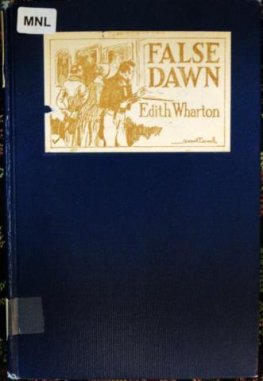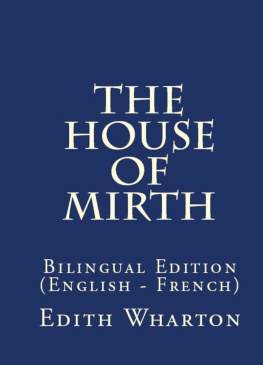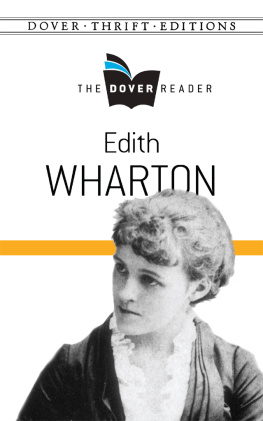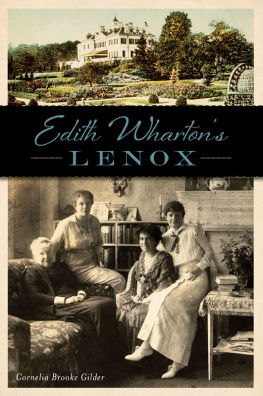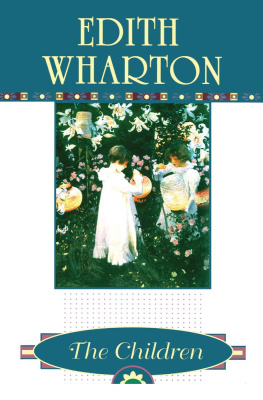Edith Wharton - False Dawn
Here you can read online Edith Wharton - False Dawn full text of the book (entire story) in english for free. Download pdf and epub, get meaning, cover and reviews about this ebook. genre: Prose. Description of the work, (preface) as well as reviews are available. Best literature library LitArk.com created for fans of good reading and offers a wide selection of genres:
Romance novel
Science fiction
Adventure
Detective
Science
History
Home and family
Prose
Art
Politics
Computer
Non-fiction
Religion
Business
Children
Humor
Choose a favorite category and find really read worthwhile books. Enjoy immersion in the world of imagination, feel the emotions of the characters or learn something new for yourself, make an fascinating discovery.
- Book:False Dawn
- Author:
- Genre:
- Rating:5 / 5
- Favourites:Add to favourites
- Your mark:
- 100
- 1
- 2
- 3
- 4
- 5
False Dawn: summary, description and annotation
We offer to read an annotation, description, summary or preface (depends on what the author of the book "False Dawn" wrote himself). If you haven't found the necessary information about the book — write in the comments, we will try to find it.
False Dawn — read online for free the complete book (whole text) full work
Below is the text of the book, divided by pages. System saving the place of the last page read, allows you to conveniently read the book "False Dawn" online for free, without having to search again every time where you left off. Put a bookmark, and you can go to the page where you finished reading at any time.
Font size:
Interval:
Bookmark:
FALSE DAWN
(THE FORTIES)
by Edith Wharton
PART 1.
1.
HAY, verbena and mignonette scented the languid July day. Large strawberries, crimsoning through sprigs of mint, floated in a bowl of pale yellow cup on the verandah table: an old Georgian bowl, with complex reflections on polygonal flanks, engraved with the Raycie arms between lions heads. Now and again the gentlemen, warned by a menacing hum, slapped their cheeks, their brows or their bald crowns; but they did so as furtively as possible, for Mr. Halston Raycie, on whose verandah they sat, would not admit that there were mosquitoes at High Point.
The strawberries came from Mr. Raycies kitchen garden; the Georgian bowl came from his great-grandfather (father of the Signer); the verandah was that of his country-house, which stood on a height above the Sound, at a convenient driving distance from his town house in Canal Street.
Another glass, Commodore, said Mr. Raycie, shaking out a cambric handkerchief the size of a table-cloth, and applying a corner of it to his steaming brow.
Mr. Jameson Ledgely smiled and took another glass. He was known as the Commodore among his intimates because of having been in the Navy in his youth, and having taken part, as a midshipman under Admiral Porter, in the war of 1812. This jolly sunburnt bachelor, whose face resembled that of one of the bronze idols he might have brought back with him, had kept his naval air, though long retired from the service; and his white duck trousers, his gold-braided cap and shining teeth, still made him look as if he might be in command of a frigate. Instead of that, he had just sailed over a party of friends from his own place on the Long Island shore; and his trim white sloop was now lying in the bay below the point.
The Halston Raycie house overlooked a lawn sloping to the Sound. The lawn was Mr. Raycies pride: it was mown with a scythe once a fortnight, and rolled in the spring by an old white horse specially shod for the purpose. Below the verandah the turf was broken by three round beds of rose-geranium, heliotrope and Bengal roses, which Mrs. Raycie tended in gauntlet gloves, under a small hinged sunshade that folded back on its carved ivory handle. The house, remodelled and enlarged by Mr. Raycie on his marriage, had played a part in the Revolutionary war as the settlers cottage were Benedict Arnold had had his headquarters. A contemporary print of it hung in Mr. Raycies study; but no one could have detected the humble outline of the old house in the majestic stone-coloured dwelling built of tongued-and-grooved boards, with an angle tower, tall narrow windows, and a verandah on chamfered posts, that figured so confidently as a Tuscan Villa in Downings Landscape Gardening in America. There was the same difference between the rude lithograph of the earlier house and the fine steel engraving of its successor (with a specimen weeping beech on the lawn) as between the buildings themselves. Mr. Raycie had reason to think well of his architect.
He thought well of most things related to himself by ties of blood or interest. No one had ever been quite sure that he made Mrs. Raycie happy, but he was known to have the highest opinion of her. So it was with his daughters, Sarah Anne and Mary Adeline, fresher replicas of the lymphatic Mrs. Raycie; no one would have sworn that they were quite at ease with their genial parent, yet every one knew how loud he was in their praises. But the most remarkable object within the range of Mr. Raycies self-approval was his son Lewis. And yet, as Jameson Ledgely, who was given to speaking his mind, had once observed, you wouldnt have supposed young Lewis was exactly the kind of craft Halston would have turned out if hed had the designing of his son and heir.
Mr. Raycie was a monumental man. His extent in height, width and thickness was so nearly the same that whichever way he was turned one had an almost equally broad view of him; and every inch of that mighty circumference was so exquisitely cared for that to a farmers eye he might have suggested a great agricultural estate of which not an acre is untilled. Even his baldness, which was in proportion to the rest, looked as if it received a special daily polish; and on a hot day his whole person was like some wonderful example of the costliest irrigation. There was so much of him, and he had so many planes, that it was fascinating to watch each runnel of moisture follow its own particular watershed. Even on his large fresh-looking hands the drops divided, trickling in different ways from the ridges of the fingers; and as for his forehead and temples, and the raised cushion of cheek beneath each of his lower lids, every one of these slopes had its own particular stream, its hollow pools and sudden cataracts; and the sight was never unpleasant, because his whole vast bubbling surface was of such a clean and hearty pink, and the exuding moisture so perceptibly flavoured with expensive eau de Cologne and the best French soap.
Mrs. Raycie, though built on a less heroic scale, had a pale amplitude which, when she put on her best watered silk (the kind that stood alone), and framed her countenance in the innumerable blonde lace ruffles and clustered purple grapes of her newest Paris cap, almost balanced her husbands bulk. Yet from this full-rigged pair, as the Commodore would have put it, had issued the lean little runt of a Lewis, a shrimp of a baby, a shaver of a boy, and now a youth as scant as an ordinary mans midday shadow.
All these things, Lewis himself mused, dangling his legs from the verandah rail, were undoubtedly passing through the minds of the four gentlemen grouped about his fathers bowl of cup.
Mr. Robert Huzzard, the banker, a tall broad man, who looked big in any company but Mr. Raycies, leaned back, lifted his glass, and bowed to Lewis.
Heres to the Grand Tour!
Dont perch on that rail like a sparrow, my boy, Mr. Raycie said reprovingly; and Lewis dropped to his feet, and returned Mr. Huzzards bow.
I wasnt thinking, he stammered. It was his too frequent excuse.
Mr. Ambrose Huzzard, the bankers younger brother, Mr. Ledgely and Mr. Donaldson Kent, all raised their glasses and cheerily echoed: The Grand Tour!
Lewis bowed again, and put his lips to the glass he had forgotten. In reality, he had eyes only for Mr. Donaldson Kent, his fathers cousin, a silent man with a lean hawk-like profile, who looked like a retired Revolutionary hero, and lived in daily fear of the most trifling risk or responsibility.
To this prudent and circumspect citizen had come, some years earlier, the unexpected and altogether inexcusable demand that he should look after the daughter of his only brother, Julius Kent. Julius had died in Italywell, that was his own business, if he chose to live there. But to let his wife die before him, and to leave a minor daughter, and a will entrusting her to the guardianship of his esteemed elder brother, Donaldson Kent Esquire, of Kents Point, Long Island, and Great Jones Street, New Yorkwell, as Mr. Kent himself said, and as his wife said for him, there had never been anything, anything whatever, in Mr. Kents attitude or behaviour, to justify the ungrateful Julius (whose debts he had more than once paid) in laying on him this final burden.
The girl came. She was fourteen, she was considered plain, she was small and black and skinny. Her name was Beatrice, which was bad enough, and made worse by the fact that it had been shortened by ignorant foreigners to Treeshy. But she was eager, serviceable, and good-tempered, and as Mr. and Mrs. Kents friends pointed out, her plainness made everything easy. There were two Kent boys growing up, Bill and Donald; and if this penniless cousin had been compounded of cream and roseswell, she would have taken more watching, and might have rewarded the kindness of her uncle and aunt by some act of wicked ingratitude. But this risk being obviated by her appearance, they could be goodnatured to her without afterthought, and to be goodnatured was natural to them. So as the years passed, she gradually became the guardian of her guardians; since it was equally natural to Mr. and Mrs. Kent to throw themselves in helpless reliance on every one whom they did not nervously fear or mistrust.
Font size:
Interval:
Bookmark:
Similar books «False Dawn»
Look at similar books to False Dawn. We have selected literature similar in name and meaning in the hope of providing readers with more options to find new, interesting, not yet read works.
Discussion, reviews of the book False Dawn and just readers' own opinions. Leave your comments, write what you think about the work, its meaning or the main characters. Specify what exactly you liked and what you didn't like, and why you think so.

